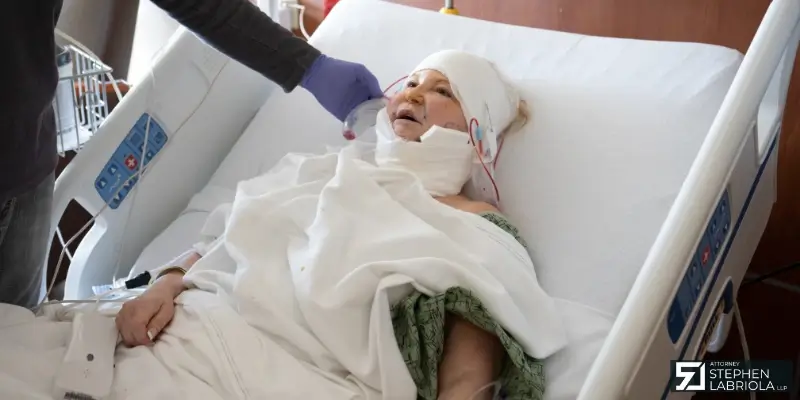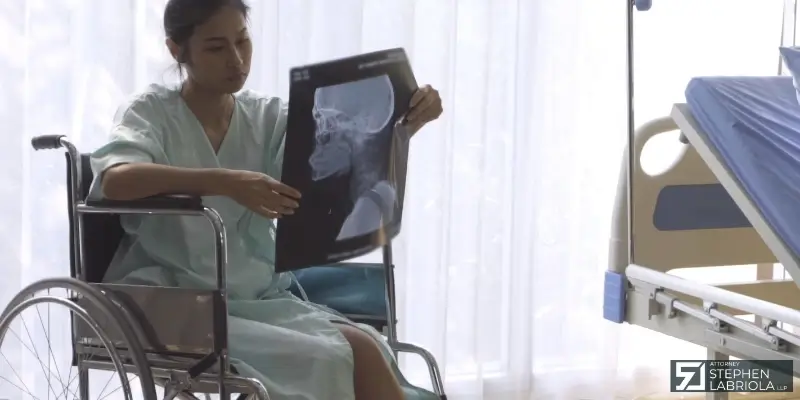Atlanta Traumatic Brain Injury Lawyer
Atlanta Traumatic Brain Injury Attorney
Traumatic brain injuries (TBIs) are caused by physical trauma to the brain. TBIs can interrupt the typical functioning of the brain for even a short period of time, which can result in permanent brain damage. A knowledgeable Atlanta traumatic brain injury lawyer can help determine your options following a TBI and advocate for compensation for your recovery.
A serious TBI is considered an injury typically requiring the injured victim to re-educate themselves on some basic life skills and potentially adapt their normal activities of daily living. An Atlanta personal injury attorney can help get you compensation for your medical costs and help obtain any assistance you might need during and after your claim.

Should I File a Traumatic Brain Injury Claim?
There are usually two types of personal injury claims involving traumatic brain injuries. First, brain trauma occurs as a result of an incident (such as a car crash or being hit on the head by something falling). Second, you could experience brain trauma that is complex and is the result of an injury that is more low-impact. If you gather all medical documentation from your treatment following an accident, it can be helpful for your attorney to review all relevant information. They can then discuss with you if you have grounds for a claim following your injury.
You should discuss your legal options with a knowledgeable brain injury attorney, especially if you are experiencing any recurring headaches, dizziness, tingling sensations, numbness, or blurred vision. If another party caused your accident and brain injury, you may likely be able to pursue a legal claim to recover damages.
What Are the Most Common Types of Traumatic Brain Injury (TBI)?
Generally, the most common TBIs are concussions (from mild to serious), and even a concussion injury that is considered mild can be troublesome in your daily life.
A TBI is a sudden, catastrophic injury disrupting regular brain function and is the result of an outside force. Brain tissue does not regenerate, which means any tissue injury can cause permanent damage and life-long medical problems.
A TBI can have a life-long effect on your daily activities. Regardless of the form of the TBI, it is considered either open or closed.
- Open TBIs – when the skull is cracked, fractured, or otherwise penetrated, such as with a gunshot wound or blunt force trauma
- Closed TBIs – when the skull is not penetrated, such as with a concussion where the skull isn’t broken
There are several common TBI injuries, including:
- Concussion – When a sudden injury to the head causes the brain to jostle internally, which can cause blood vessel damage, nerve damage, bruising, or other injuries. Concussions are not life-threatening, but they can be dangerous if not treated or properly diagnosed.
- Brain aneurysm – Sometimes trauma can cause a swelling or building of blood vessels inside the brain. This TBI can cause pressure inside the brain nerves and tissues, which results in numbness or even blurred vision, and a rupture could be life-threatening.
- Blast injury – This is trauma caused by an explosion causing both internal and external damage to your body, and this type of TBI is often experienced by members of the military.
- Closed head injury – This can occur as a result of a sudden impact injury (like a fall or collision), creating an injury inside the skull with blunt force trauma but without skull penetration.
- Carbon monoxide poisoning – If oxygen is displaced inside the body, it can deprive you of needed oxygen, and too much carbon monoxide exposure can kill brain cells that can sometimes cause permanent brain damage
- Brain hemorrhage – This is sometimes called a stroke, which occurs when a brain artery bursts and can result in brain bleeding, permanent brain damage, or death.
If you or a loved one has a TBI caused by someone else’s poor decision or negligence, you can work with an Atlanta traumatic brain injury attorney to hold that person responsible for the injury.
What Are Some Common Accidents That Result in TBIs in Atlanta, Georgia?
Personal injury accidents can result in TBIs. Each case is different, but TBIs are typically caused by an accident or an attack, such as:
- Car, truck, bus, bike, or motorcycle crashes
- Pedestrian accidents
- Boat accidents
- Accidents at work
- Assaults or violent crimes due to inadequate security
- Sports injuries
- Slip and fall accidents
- Falls from a high place
- Exposure to blast waves (usually during your military service)
This list is non-exhaustive, and an attorney can further discuss the circumstances of your accident to determine whether to pursue a TBI injury claim as well as your legal options.
Are There Any Common Symptoms of a Traumatic Brain Injury (TBI)?
The brain is a complex organ, and victims of brain trauma typically experience a wide variety of symptoms following an injury. Their symptoms can depend on the severity of the injury, the type of injury, and the area of the brain that may have been impacted during a TBI.
With mild cases of TBI, some common symptoms may be present, including:
- Nausea or vomiting
- Confusion
- Disorientation
- Dizziness
- Lightheadedness
- Headaches
- Loss of consciousness – temporary
- Tiredness
- Drowsiness
- Blurred vision
- Sensory changes, like being sensitive to sounds or light
- Mood changes
- Behavior changes
- Disrupted sleep habits
- Difficulty concentrating or focusing
- Memory issues
Also, accidents resulting in moderate to severe TBI trauma can involve more serious symptoms, such as:
- Headaches – severe or persistent
- Ongoing vomiting or nausea
- Agitation or restlessness
- Ongoing disorientation
- Coordination issues
- Loss of vision
- Dilation of pupils
- Loss of consciousness – extended
- Seizures or convulsions
- Slurred speech
- Tingling or numbness in limbs
There are other symptoms someone might experience following a head injury, and getting help should be your first priority.
None of the above symptoms should be overlooked if they happen after a brain injury, and they can emerge after time has passed after the accident occurs. Some people don’t get treatment or delay treatment because they don’t know the symptoms for which to stay alert.
If you have noticed any of these common symptoms after a traumatic brain event, it’s incredibly important to seek medical help right away and then consult with a knowledgeable attorney in your area.
How Can a Georgia Traumatic Brain Injury Attorney Help?
As soon as you have addressed any injuries following a head injury and gotten appropriate medical attention, it’s important to contact a legal advocate to discuss a potential claim from the negligence of the other party. An experienced attorney has handled many Georgia cases just like yours and can help you recover the compensation you require.
It can be difficult to worry about the legal process, especially following a brain injury. A compassionate attorney can help support your case by handling what you need from start to finish.

FAQs
How Much Money Can You Get from a Traumatic Brain Injury Claim?
The amount of money you might get from a TBI claim can vary widely depending upon several factors, like:
- The injury severity
- The impact on someone’s life, including lost wages
- The paid and necessary future medical expenses
- The accident circumstances
- The legal jurisdiction
Due to the complicated nature of TBI cases and laws, help from a personal injury attorney in Atlanta with experience handling cases like yours is necessary to maximize your potential recovery.
Do TBI Patients Ever Completely Recover?
The ability for someone to completely recover from a TBI depends on the injury severity, but the exact amount of recovery can be unpredictable. However, even without a complete recovery, rehabilitation, and proper medical treatment can help with their progress. Family and friend support, help with emotional trauma symptoms, and consulting with a compassionate legal team can all help with TBI recovery.
Is There Anything Not to Say to Someone with a TBI?
When speaking with someone with a TBI, you can avoid phrases comparing their injury or recovery experience to someone else, do not minimize their trauma, and avoid pressuring them to recover quickly. Remain patient and compassionate and acknowledge their progress and recovery efforts through positive reinforcement.
Are There Any Major Changes in Someone’s Personality After a Traumatic Brain Injury?
Sometimes, a TBI can change someone’s personality, which can lead to perceptible changes in emotional regulation, behavior, and social interactions. You may notice these personality changes can significantly impact someone’s daily life. More severe TBIs can result in big personality changes, and even mild head injuries can lead to behavioral changes that might be noticeable.
Contact an Experienced Atlanta, GA, TBI Attorney Who Has Successfully Handled TBI Claims
Regardless of the type of head injury you have endured, your age, or the way you sustained serious brain trauma, an attorney with extensive experience handling personal injury claims like yours can discuss your legal options and help negotiate for the recovery you need.
Stephen LaBriola can help you or a loved one through the process of filing your TBI claim. Contact his office to schedule a free consultation so you can begin to rebuild your life following your traumatic brain injury accident.



